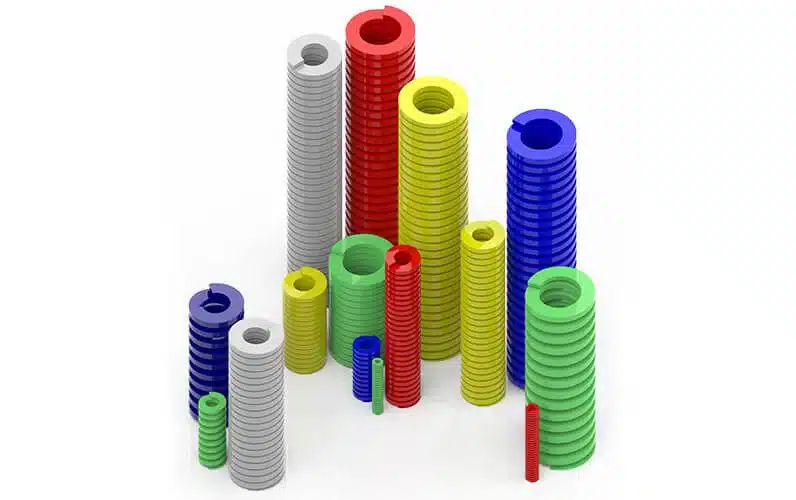
As expert spring manufacturers, customers from across the world choose our products for high-quality, dependable, and long-lasting results. With ISO 9001 certified processes and a team of experienced engineers, we supply stock and bespoke die springs to many industries.
In our extensive spring catalogue, we have a wide range of standard springs that can be manufactured and delivered quickly. In the catalogue, you’ll find all that you need to know regarding technical information, tolerances, and materials, as well as our broad range of other spring types.
We also offer custom springs for more niche applications, where our team collaborate with you to produce an end result completely tailored to your needs.
Custom die springs are often chosen for applications that have unique, specific demands. If you’re struggling to find what you need in our catalogue, our team can work with you to develop a custom solution. Here are some things we might consider when designing your springs:
If you’re not sure whether you need bespoke springs, please get in touch with our team.
As a member of the world-renowned Lesjöfors group, we’re able to supply an extensive range of stock springs. We’ve developed a solid production process for our die springs, which includes:
For more technical information about our stock die springs, please consult pages 50-67 of our catalogue.
When working with us, you’ll be supported at each stage, from initial CAD design right through to final quality assurance. Whether you need a one-off specialist prototype or a high-volume order, we’ll bring the same attention to detail and customer service.
To help your springs last longer, we offer surface treatments including plating, finishing, and heat treatment. If you need more than one type of spring, we’re also suppliers of coil springs, pressings, and wire forms.
If you have any questions, please do not hesitate to contact our die spring suppliers, who will be happy to provide you with the information you need.
Die springs are strong concentrated hybrid versions of compression springs made with rectangular wire instead of their circular counterparts. They are also referred to as ‘high force compression springs‘ because they are specially designed to handle a great amount of environmental stress.
As high-force compression springs, a die spring can take a higher load when required, approximately 30% more than a standard compression spring. It can also handle temperatures up to 475 degrees. They also are engineered to give predetermined pressure at a given compression reliably and consistently.
In addition, they are designed to be loaded in excess to cover the requirements of perforating material, in some instances, metals.
Die springs have many applications across many key industries, including:
First, define the required lifetime, hole diameter, and total spring force. Check that the spring fits the available space by comparing hole diameter, shaft diameter, and unloaded length with the catalogue. Then choose the correct force class (L, 1–6) from the colour-coded series that matches your force and lifetime needs. Ensure the maximum deflection (s₃) is not exceeded and apply at least 5% preload of the unloaded length. Finally, confirm that operating conditions, including material limits and the 200 °C maximum working temperature, are suitable.
Here is an inclusive list of the main sectors and applications where Die Springs improve designs and make a positive difference.